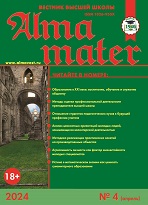UDC 37.09:78.03
https://doi.org/10.20339/AM.08-19.087
M.A. Lazarev is Cand.Sci. (Pedagogy), head of scientific research department at Chekhov Technical College, Moscow Region e-mail: humanityspace@gmail.com ; and O.V. Stukalova is Dr.Sci. (Pedagogy), doc. at Institute of Art Education and Cultural Studies of Russian Academy of Education e-mail: chif599@mail.ru
Presented are results of research on testing of developed by the authors functional model for evaluating of quality of culturological education in information space. To experimental work were attracted higher educational institutions of Moscow, Ulyanovsk, Naberezhnye Chelny and Leningrad region, as well as colleges of the Moscow region. This model takes into account requirements of integrated approach to assessing quality of education and presents itself as combination of functional components. This functional model is also aimed at assessing immanent to formation of “person of culture” processes of socialization and inculturation. Proved is effectiveness of elaborated by the authors functional model.
Key words: culturological education, informational space, evaluation of quality of education, students, criteria.
References
1. Asmolov, A.G. Strategy of socio-cultural modernization of education: on the way to overcoming of the crisis of identity and building of civil society. Problems of education. 2008. No. 1. P. 65–86.
2. Astafieva, O.N. Informational communicative competence of personality under conditions of formation of modern information society. SOTSIS. 2000. No. 6. P. 21–29.
3. Bibler, V.S. Culture: dialog of cultures. Problems of philosophy. 2005. No. 6. P. 33–38.
4. Egorycheva, I.D. On the problem of role of reflection in self-realization and it’s types. Actual problems of psychological problems. 2011. No. 4. P. 40–48.
5. Kagan, M.S. Philosophical theory of value. St.-Petersburg, 1997.
6. Lazarev, M.A., Podvoysky, V.P., Stukalova, O.V. Pedagogical support for overcoming of social indifference in students of humanitarian universities: social cultural approach. Moscow, 2016.
7. Leontiev, A.N. Activity. Consciousness. Personality. Moscow, 2004.
8. Podvoysky, V.P., Butov, A.Yu., Olenev, S.M., Lazarev, M.A. Co-evolution as innovative idea in the system of psychological pedagogical science. Humanitarian space. 2012. No. 1. P. 163–174.
9. Soshenko, I.G. Consciousness of human being in socio-cultural dynamic of information society. In: The world of human being and human being in the world: philosophical theoretical and scientific methodological aspects. Stavropol, 2007. P. 172–178.
10. Tkhostov, A.Sh. Culture and pathology: side effects of socialization. National psychological journal. 2006. November. P. 20–28.
11. Herskovits, M.J. Cultural Anthropology. New York, 1955.
12. Honigman, J.J. Culture and Personality. New York, 1954.
13. Stukalova, O.V. The system of cultural and creative development of students in educational environment of higher education institutions in the sphere of culture and art. Espasios. 2017. Vol. 38. No. 56. P. 33.











.png)






